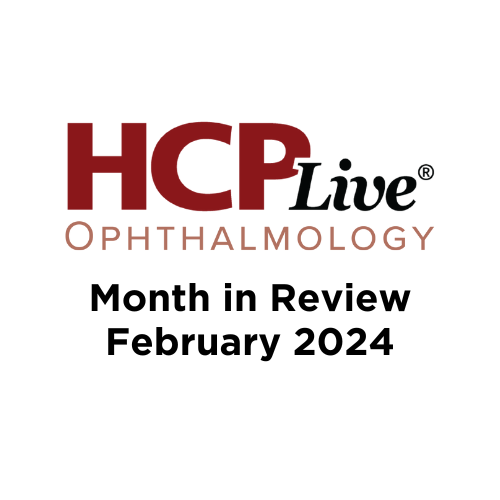Ophthalmology Month in Review: February 2024
Our February 2024 ophthalmology month-in-review features an in-depth look into global vision loss rates, a new clinical quiz on AAO guidelines, and two episodes of our flagship ophthalmology podcast, New Insight with Veeral Sheth, MD.
Credit: HCPLive

As we reflect on February 2024, the scope of our coverage in ophthalmology continues to expand, while the year continues to inch forward toward meeting season again. In February, the HCPLive Ophthalmology editorial team introduced new offerings into our ophthalmic coverage, including a new clinical quiz and two new podcast offerings, and continued to offer our bread-and-butter clinical write-ups.
In a new feature piece, the HCPLive Ophthalmology editorial team explores the aging Baby Boomer population, diving into global projections of vision loss, the impact of social determinants of health, and the demand for ophthalmic care. This month’s clinical quiz asked challengers to test their knowledge of the AAO guidelines for inherited retinal degeneration, based on 2022 guidelines.
Two practice-changing studies revealed an artificial intelligence (AI) chatbot could match or exceed ophthalmologists in diagnosing and managing retinal disease and glaucoma and established a link between vision impairment and adverse psychosocial outcomes.
Finally, our flagship ophthalmology podcast, New Insight with Veeral Sheth, MD, released two new episodes featuring a round-table discussion on all things retina with two specialists and a comprehensive overview of the role of contract research organizations (CROs) in ophthalmic clinical research.
Unique Offerings
‘Vision Loss in Later Life is not Normal’: Vision Loss Projected to Rise in Older Adults
As the Baby Boomer generation begins to transition into older age, this dramatic rise in the aging population is expected to increase demands for ophthalmic care. This subsequent rise is expected to be accompanied by an increased prevalence of vision loss, from irreversible blinding diseases to modifiable, easy-to-treat common causes of vision loss.
A new feature from the HCPLive Ophthalmology editorial team encapsulates this striking growth in vision loss, from the global projections to the implications of social determinants of health. The team spoke with numerous experts, including two ophthalmologists and an expert on healthy aging, to obtain perspective on why these issues are happening and how they can be addressed head-on.
Clinician Quiz: AAO Guidelines for Inherited Retinal Degenerations
Are you interested in testing out your knowledge? The HCPLive editorial staff has created a short quiz on clinical assessment recommendations for patients with inherited retinal degenerations based on 2022 guidelines released by the American Academy of Ophthalmology (AAO).
In the guidelines, the AAO outlines recommendations for managing inherited retinal degenerations, detailing testing procedures and timing for patients across four IRD classes
Test your skills in February’s quiz and keep an eye out for the March edition coming soon!
Cross-Specialty Interest
AI Chatbots Equal Ophthalmologists in Glaucoma, Retinal Disease Management
A new analysis published in JAMA Ophthalmology found artificial intelligence large language models (LLMs) can meet or exceed trained ophthalmologists in the diagnosis and management of glaucoma and retinal diseases. ChatGPT-4 demonstrated comparable diagnostic accuracy and completeness among clinical questions and cases versus 12 attending specialists and three senior trainees in ophthalmology.
“The performance of GPT-4 in our study was quite eye-opening,” the investigators said. “We recognized the enormous potential of this AI system from the moment we started testing it and were fascinated to observe that GPT-4 could not only assist but in some cases, match or exceed, the expertise of seasoned ophthalmic specialists
Vision Impairment Associated with Symptoms of Depression, Anxiety
Another study published in JAMA Ophthalmology linked vision impairment to a variety of psychosocial outcomes, including symptoms of depression, anxiety, and measures of social isolation among US adults aged ≥65 years. The investigative team from the Wilmer Eye Institute found those with objectively measured or self-reported vision impairment demonstrated a greater likelihood of depressive and anxiety symptoms and severe social isolation.
“While maintaining eye health will always be important, these findings provide evidence to support prioritizing research aimed at enhancing the health and inclusion of people with vision impairment,” they wrote.
New Insight with Veeral Sheth, MD
The first New Insight with Veeral Sheth, MD episode of 2024 featured a round-table discussion on all things retina with returning guest David Eichenbaum, MD, the director of research for Retina Vitreous Associates of Florida, as well as first-time guest Roger Goldberg, MD, a vitreoretinal surgeon at Bay Area Retina Associates
Together, the trio of retina specialists dove into a wide array of hot topics in their specialty and across the field of eye care. The topics varied between recent conference discussions, an upcoming anniversary of a landmark agent, head-to-head comparisons of the current therapeutic landscape, and what is to come in the rest of the year.
Prefer to listen on your favorite streaming service? Listen on Spotify here.
New Insight: Role of Contract Research Organizations in Retina w/ Brad Doerschuk
The second episode of New Insight in February featured a recent conversation between Sheth and Brad Doerschuk, the chief executive officer of InFocus Clinical Research, on the important role of contract research organizations (CROs) in ophthalmology research.
In their conversation, Sheth and Doerschuk shed light on the role of CROs in managing clinical trials, emphasizing their extensive service provision, including clinical project management and site monitoring. The two stakeholders dive into the evolution of the retina space in recent decades, owing to its explosion of clinical development, and discuss what they think is to come in the rest of the year.
Want to watch the conversation? Check out the video below and be sure to subscribe to our Youtube channel for all New Insight video content.